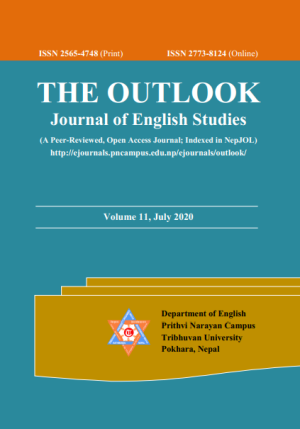Human Embeddedness with Nature: An Ecocritical Reading of Some Mundhums in Limbu Culture
DOI:
https://doi.org/10.3126/ojes.v11i0.36313Keywords:
Nature, culture, indigenous knowledge system, ecology, justice, harmonyAbstract
Mundhums as philosophies of life in Limbu culture view human beings and nature, in both terrestrial and celestial sphere as part of large and embedded ecological family sharing common heritage and ancestries. Human-nature relationship described in Imansing Chemjong’s collection of Kirat Mundhum Khahun and Bairagi Kaila’s collections of Mujingna- Kheyangna Mundhum, Lahadangna-Suhampheba Mundhum,Tangsing Takma Mundhum, Namsami-Kesami Mundhum and the references of Pajaiba Mundhum, Luplinama Adannama Mundhum,Thimjik Mundhum show how human beings in the dynamics of affect and affected by, integrate with ecological surroundings. In order to substantiate the major claim that Mundhums, with unique dimensions of indigenous knowledge system of Limbus put nature at center and hence they are ecocentric, I use theoretical insights from Arne Naess’ concept of deep ecology, Aldo Leopold’s assertion of the land ethic backed up by critical readings on ecocritical and Mundhum discourses.
Downloads
Downloads
Published
How to Cite
Issue
Section
License
This license enables reusers to distribute, remix, adapt, and build upon the material in any medium or format for noncommercial purposes only, and only so long as attribution is given to the creator.

